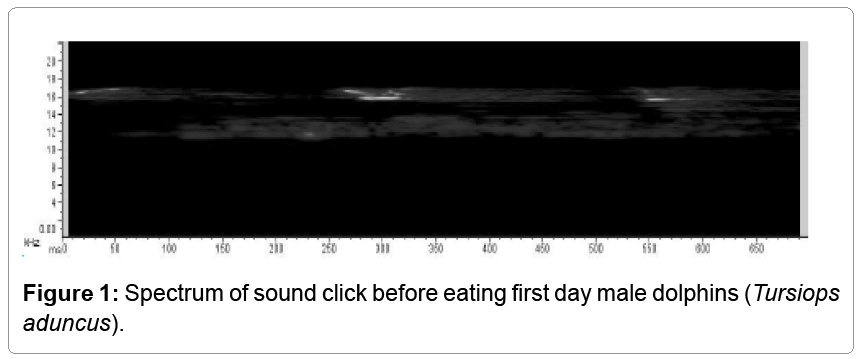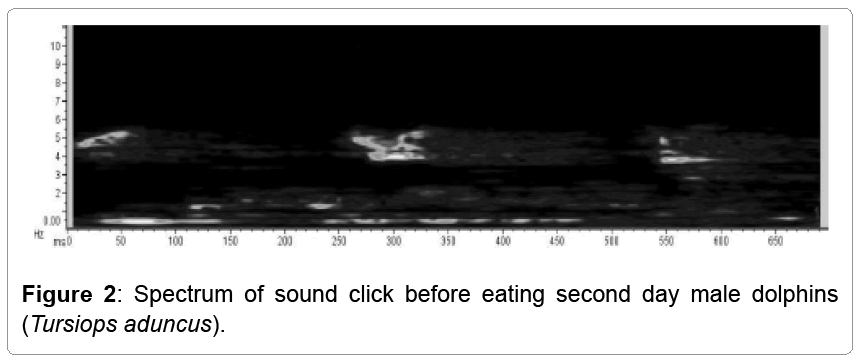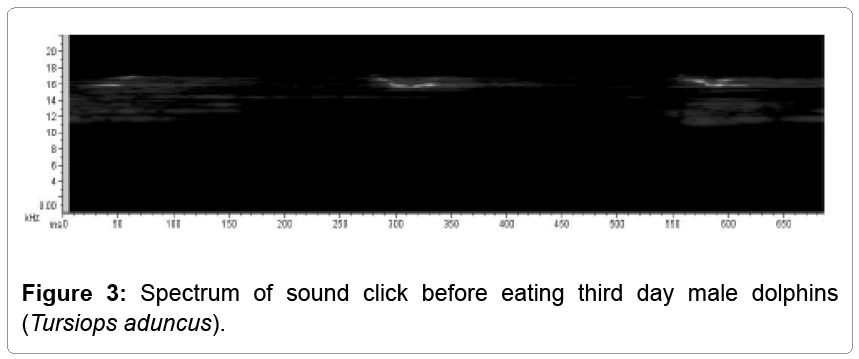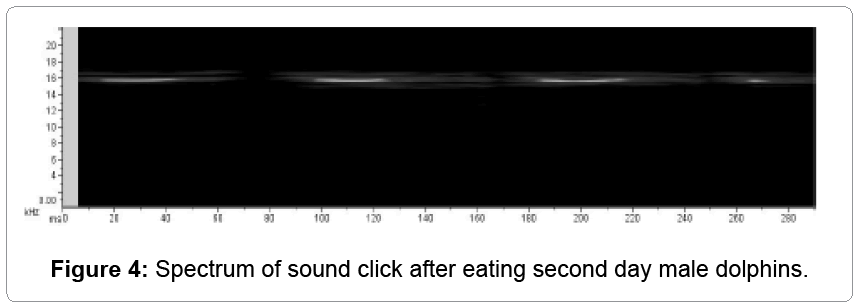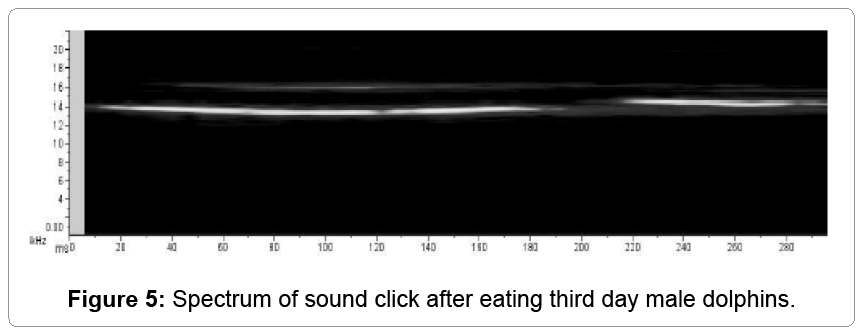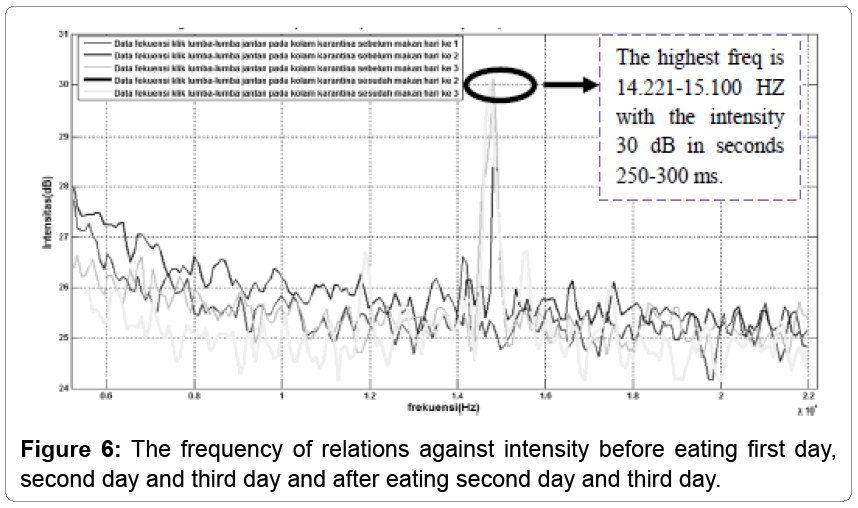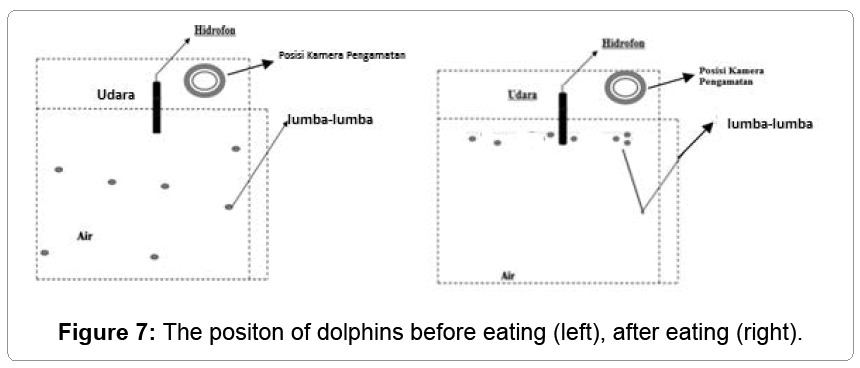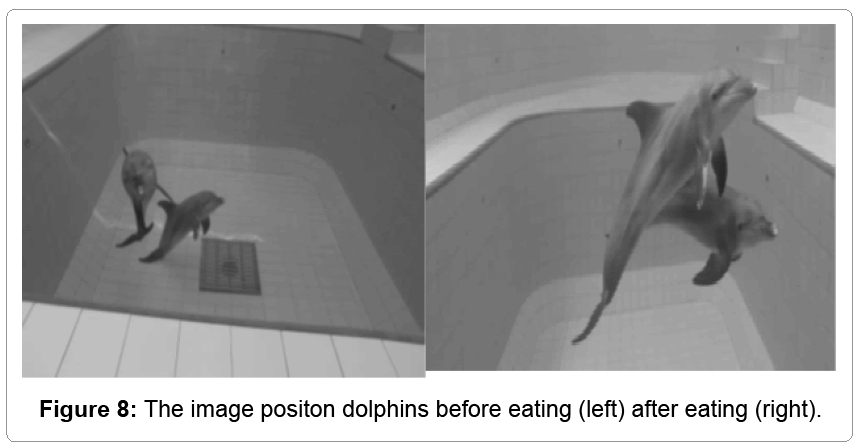Research Article Open Access
Bioacoustic Characteristic Click Sound and Behaviour of Male Dolphins Bottle Nose (Tursiops aduncus)
Wulandari PD, Pujiyati S, Hestirianoto T and Lubis MZ*Department of Marine Science and Technology, Faculty of Fisheries and Marine Sciences, Bogor Agricultural University, Indonesia
- *Corresponding Author:
- Lubis MZ
Department of Marine Science and Technology
Faculty of Fisheries and Marine Sciences
Bogor Agricultural University
Jln Agatis Kampus IPB Dramaga
Bogor, 16680, Indonesia
Tel: +62 251 8425635
E-mail: lubiszainuddin@gmail.com
Received Date: December 07, 2015; Accepted Date: December 17, 2015; Published Date: January 11, 2016
Citation: Wulandari PD, Pujiyati S, Hestirianoto T, Lubis MZ (2016) Bioacoustic Characteristic Click Sound and Behaviour of Male Dolphins Bottle Nose (Tursiops aduncus). J Fisheries Livest Prod 4:160. doi:10.4172/2332-2608.1000160
Copyright: © 2016 Wulandari PD, et al. This is an open-access article distributed under the terms of the Creative Commons Attribution License, which permits unrestricted use, distribution, and reproduction in any medium, provided the original author and source are credited.
Visit for more related articles at Journal of Fisheries & Livestock Production
Abstract
We Dicsuss the problem of bioacoustics research, Bioacoustic is the science that combines biology and acoustics which refers on the production of sound, dispersion and reseption animals and humans. This study using acoustic and behavioral observations of dolphins by using passive acoustic science (bioacoustic) to see the difference pattern of sound, and treatment given in this study is a before and after eating at Safari Park Indonesia, Cisarua Bogor. Sound dolphins have the lowest intensity value of 28.03 dB and highest is 32.01 dB. Parameter salinity 30 ppm and temperature of 23°C with a pool depth of 4.4 meters. Range frequency the highest is 14.000-16.000 Hz and intensity the highest 23 dB at the first day after meal a click sound. Differences in sound intensity values before and after eating is the highest value of a click on the second day with the highest intensity was 32.01 dB and lowest before eating.
Keywords
Bioacoustic; Male dolphins bottle nose (Tursiops aduncus); Frequency; Intensity
Introduction
In the world of fisheries, acoustic passive methods applied to monitor marine mammals and the sea biota other on [1]. Signals obtained from recording sound marine mammals that very weak for calls amplification and difficult to determine of which sound the direction that, Passive sound derived from animals target [2]. A method of acoustic passive also used in the field military service in the development of security system of attackers under water in the estuari by doing recording sound which is raised from diving [3]. Hearing of Marine mammals in is measured in the living subject with use audiometer behaviour or electro physiological techniques [4]. Characteristic of hearing can be predicted based on the frequency of the results of the production of sound that done on the observation the characteristic sounds, good is do or not have response behavior in trained animals [5] or morphological hearing, including the trait of biomechanics from the basilar and characteristic of other sounds [6]. Still little known the sound has type yelping (burst), characteristic of spectral, temporal, and amplitude a shrill sound pulse of type the sound of a click very few explored. As for early description in literature, most of it only worth qualitative, that reflects interpretation hearing subjective and classification hearing in humans [7]. The sound of a click generally used for echolocation, while the sound of a whistle yelping ( burst) and played a major role in internal communication and across group [1]. Whistle that continues indefinitely, giving signals frequency [8], with various wide emissions of 800 Hz and 28.5 KHz [2], often there are components harmonic [2]. Hearing to dolphins ranged from about 50 Hz-150 KHz, with the variation of additional among species [9]. Bioacoustus is the knowledge that combines biological and acoustics which usually refer to research on the production of sound, dispersion through an elastic medium, and acceptance in animals, including humans [10]. But because the science of acoustics growing rapidly for dolphins, researchers formerly had been exercising records and analysis vocalization [11]. This study aims to analyse and distinguish characteristics the sound of a click male dolphins bottle nose (Tursiops aduncus) in the pool quarantine, by using the method bioacoustic and see behavior male dolphins bottle nose (Tursiops aduncus), with treatment after meals and after meals, 3 days data retrieval.
Tools and Materials
Tools and material used in the research methodology this is hidrofon SQ3 (instrument passive acoustic), a thermometer hg to measure the temperature of water; refractometer for measuring salinity water is in swimming. Dolphin EAR 100 hydrophones with serial number DE989505, camera underwater gopro hero 3 + serves to record the movement of to dolphins visually while in the pool.
Software Matlab and Wavelab used to cultivate the data collected. Material used by 2 the tail of male dolphin bottle nose. The data observation collected from dolphins in the pool. Name of pool is quarantine and do the processing with using software that is wavelab and data that had been deposited into wavelab will be conducted filters with cutting the important data that is sound the porpoise actually. Analysis next executed is analysis power spectral density (software Matlab). This software converts source of sound from inside the water into electrical signals, and can then be amplification analyzed [12]. Hydrophone is usually in the form of a piezo-electric slab, and Standardization of Hydrophone for purposes of biocoustic issued by Bioacoustic Inc. Limits a range of frequencies provided was the frequency of sounds that can be heard normally by using earphones for humans [10]. Software wavelab have function for recording sound directly from dolphin ear, so a lower limit frequencies can be detected will be more low as reach several hz, and the upper limit of a frequency that can be detected can reach more than 22 KHz.
Fourier transform
The basis of characteristic frequency on a signal is transformation fourier by Brook and Wynne [9]. Fast fourier transform instead (FFT) is a algorithm to count discrette fourier transform instead (DFT). Functions of a general of transformation fourier is find components frequency signal that is hidden by a signal the domain time of with noise [10] is:
S = fft (y) (1)
S = fft(y,n) (2)
The form of the orders (1) and (2 almost the same, that is counting dft of vector x, only on the order of (2) throne with the use of parameter long FFT (n):
 (3)
(3)
 (4)
(4)
In the equation, t is time, and f is the frequency. x is a signal notation in the space of time and X is a notation for signals in the frequency domain. Equation (3) is called the Fourier transform of x (t), while equation (4) is called the inverse Fourier transform of X (f), namely x (t). Equation (1) can also be written as:
Cos(2_ft) + jSin(2_ft) (4)
Fourier transformation can capture information whether a signal having a specific frequency or not, but can not capture the frequency in which it occurs. Command form (3) and (4) is almost the same, that compute the DFT of vector x, only the command (4) is added with the use of the FFT length parameter (n).
Power spectral density
The frequency of a wave is naturally determined by the frequency source. The rate of the wave through a medium is determined by the properties of the medium. Once the frequency (f) and speed of sound (v) of the wave has been given, then the wavelength (λ) has been set. With the relationship f = 1 / T can be obtained equation (5):
 (5)
(5)
Because the study used the speed of sound in the water medium, ie seawater. Then the speed of sound in air is denoted by (v) can be changed with the speed of sound in water that is denoted by (C), so that equation (6) :
 (6)
(6)
Power spectral density (PSD) definition as the magnitude of the power per intervals frequency, in the form of mathematics [3]:
 (7)
(7)
Calculation psd in matlab uses the method welch [10], namely looking for DFT (Based on accounts with algorithms FFT), then squaring the value of the magnitude.
Processing and analysis data of dolphin sound
Data processing acoustic using software. The sound produced male dolphins bottle nose and yielding fast fourier transform instead (FFT). FFT is algorithm to count transformation fourier discrete (FFT) and its reverse. A transformation fourier change time (or room with the frequency and sebaliknya. akibatnya, transformation fourier fast much used for many application in engineering, science, and mathematics.
Result and Discussion
Sound of mamals (dolphins) to in this research is the noise that derived from dolphin out of the skull of dolphins [13], sound is a very important thing to behavior while communicating to several kinds of fish [14]. Mammals can issue various amplitude votes for communicating in exchange information. Result from a voice too the impact of behavior such as at eating, move, escape the enemy, and reproduction (sexuality and phase enlargement) [11]. From the data of recording sound, dolphins bottle nose (Tursiops truncatus) having three type a different voice. The result of sound can be seen in the table below.
Based on Table 1 frequency relationship to the intensity of male dolphins before eating on first day have maximum frequency is 21963.87 Hz. Click 1 has a minimum intensity of 18.43 dB and the maximum intensity is 29.38 dB. At the sound of dolphins click 2 has a minimum intensity is 17.78 dB and maximum intensity 28.86 dB. At 3 clicks minimum intensity is 17.75 dB and maximum intensity 28.00 dB. At the click of 4 intensity has a 18.03 dB minimum and maximum intensity is 28.17 dB. The minimum intensity higher click 1 is 18.43 dB and a low minimum intensity at click 3 is 17.75 dB and a low maximum intensity at click 3 clicks are 28.00 dB and the highest maximum intensity is 29.38 dB on click 1. The frequency of the intensity of male dolphins after eating on first day can be seen in Table 2.
| Sound click | Max intensity (dB) | Min intensity (dB) | Max freq. (Hz) | Min freq. (Hz) | Range freq. (Hz) | Range intensity (dB) |
|---|---|---|---|---|---|---|
| 1 | 29.38 | 18.43 | 21963.87 | 5254.1 | 16709.77 | 18.43 |
| 2 | 28.86 | 17.78 | 21963.87 | 5254.1 | 16709.77 | 11.08 |
| 3 | 28.0 | 17.75 | 21963.87 | 5254.1 | 16709.77 | 10.25 |
| 4 | 28.17 | 18.03 | 21963.87 | 5254.1 | 16709.77 | 10,14 |
Table 1: Frequency to intensity before eating in first day.
Based on Table 2, table of frequency relationship to the intensity of male dolphins after eating on day 1 with a maximum frequency of 21963.87 Hz. Click 1 has a minimum intensity of 18.41 dB and the maximum intensity is 28.90 dB. At the sound of dolphins click 2 has a minimum intensity of 18.08 dB and maximum intensity 28.14 dB. At 3 clicks minimum intensity of 17.89 dB and maximum intensity 26.40 dB. At the click of 4 minimum intensity is 17.68 dB and intensity end 29.06 dB. The minimum intensity higher click 1 is 18.41 dB and a low minimum intensity at the click 4 is 17.68 dB, while the low at 3 clicks are 26.40 dB and the highest maximum intensity of 29.06 dB on Click 4. In the intensity range after feeding days 1 intensity visible click 1 is 10.49 dB. The frequency of the intensity of male dolphins before eating on second day can be seen in Table 3.
| Sound click | Max intensity (dB) | Min intensity (dB) | Max freq. (Hz) | Min freq. (Hz) | Range freq. (Hz) | Range intensity (dB) |
|---|---|---|---|---|---|---|
| 1 | 28.90 | 18.41 | 21963.87 | 5254.1 | 16709.77 | 10.49 |
| 2 | 28.14 | 18.08 | 21963.87 | 5254.1 | 16709.77 | 10.06 |
| 3 | 26.40 | 17.89 | 21963.87 | 5254.1 | 16709.77 | 8,51 |
| 4 | 29.06 | 17.68 | 21963.87 | 5254.1 | 16709.77 | 11,38 |
Table 2: Frequency to intensity after eating in first day.
| Sound click | Max intensity (dB) | Min intensity (dB) | Max freq. (Hz) | Min freq. (Hz) | Range freq. (Hz) | Range intensity (dB) |
|---|---|---|---|---|---|---|
| 1 | 26.43 | 23.15 | 21963.87 | 5254.1 | 16709.77 | 3,26 |
| 2 | 28.70 | 22.42 | 21963.87 | 5254.1 | 16709.77 | 6,28 |
| 3 | 26.12 | 23.07 | 21963.87 | 5254.1 | 16709.77 | 3,05 |
| 4 | 26.37 | 23.05 | 21963.87 | 5254.1 | 16709.77 | 3,32 |
Table 3: Frequency to intensity before eating in second day
Based on Table 3 before makan the quarantine pool on second day with a maximum frequency of 21963.87 Hz. At a minimum intensity of clicks 1 has an intensity of 23.15 dB and the maximum intensity is 26.43 dB. While the sound of a dolphin clicks 2 has a minimum intensity of 22.42 dB, the maximum intensity of 28.70 dB, and the sound of a dolphin clicks 3 has a minimum intensity of 23.07 dB and a maximum value of 26.12 dB. At the click of 4 minimum intensity value has a value of 23.05 dB and maximum intensity 26.37 dB. We can see the intensity of dolphin clicks 1 has a higher minimum intensity is 23.15 dB and maximum intensity is high on clicks 2 is 28.70 dB while the intensity of the low minimum on clicks 2 is 22.42 dB and maximum intensity the lowest was 26.12 dB. The frequency of the intensity after eating second day can be seen in Table 4.
| Sound click | Max intensity (dB) | Min intensity (dB) | Max freq. (Hz) | Min freq. (Hz) | Range freq. (Hz) | Range intensity (dB) |
|---|---|---|---|---|---|---|
| 1 | 28.62 | 23.25 | 21963.87 | 5254.1 | 16709.77 | 5,37 |
| 2 | 29.79 | 21.73 | 21963.87 | 5254.1 | 16709.77 | 8,06 |
| 3 | 32.56 | 23.15 | 21963.87 | 5254.1 | 16709.77 | 9,41 |
| 4 | 28.05 | 23.04 | 21963.87 | 5254.1 | 16709.77 | 5,01 |
Table 4: Frequency to intensity after eating in second day.
Based on Table 4 after feeding on quarantine pool on second day with a maximum frequency of 21963.87 Hz. At a minimum intensity of clicks 1 has an intensity of 23.25 dB and the maximum intensity is 28.62 dB. While the sound of a dolphin clicks 2 has a minimum intensity of 21.73 dB and maximum intensity 29.79 dB. At the sound of a dolphin clicks 3 has a minimum intensity of 23.15 dB and a maximum value of 32,56 dB. At the click of 4 minimum intensity value has a value of 23.04 dB and maximum intensity 28.5 dB. We can see the intensity of dolphin clicks 1 has a higher minimum intensity is 23,25 dB and maximum intensity high at 3 clicks is 32.56 dB while the intensity of the low minimum on clicks 2 is 21.73 dB and maximum intensity the Lowest was 28.5 dB at the click 4. The frequency of the intensity before eating third day can be seen in Table 5.
| Sound click | Max intensity (dB) | Min intensity (dB) | Max freq. (Hz) | Min freq. (Hz) | Range freq. (Hz) | Range intensity (dB) |
|---|---|---|---|---|---|---|
| 1 | 26.89 | 23.17 | 21963.87 | 5254.1 | 16709.77 | 3,72 |
| 2 | 29.5 | 23.16 | 21963.87 | 5254.1 | 16709.77 | 6,34 |
| 3 | 29.87 | 23.26 | 21963.87 | 5254.1 | 16709.77 | 6,71 |
| 4 | 27.84 | 22.82 | 21963.87 | 5254.1 | 16709.77 | 5,02 |
Table 5: Frequency to intensity before eating in third day.
Based on Table 5 frequency to intensity before eating the quarantine pool on third day with a maximum frequency of 21963.87 Hz. At a minimum intensity of clicks 1 has an intensity of 23.17 dB and the maximum intensity is 26.89 dB. While the sound of a dolphin clicks 2 has a minimum intensity of 23.16 dB and maximum intensity 29.50 dB. At the sound of a dolphin clicks 3 has a minimum intensity of 23.26 dB and a maximum value of 29.87 dB. At the click of 4 minimum intensity value has a value of 22.82 dB and maximum intensity 27.84 dB. In the intensity range before feeding day 3 looks clicks 1 has an intensity of 3.72 dB, 6.34 dB second click, click 3 are 6.71 dB and 5.02 dB in click 4. The frequency of the intensity after eating third day can be seen in Table 6.
| Sound click | Max intensity (dB) | Min intensity (dB) | Max freq. (Hz) | Min freq. (Hz) | Range freq. (Hz) | Range intensity (dB) |
|---|---|---|---|---|---|---|
| 1 | 31.15 | 22.66 | 21963.87 | 5254.1 | 16709.77 | 8,49 |
| 2 | 30.88 | 23.10 | 21963.87 | 5254.1 | 16709.77 | 7,78 |
| 3 | 26.05 | 23.47 | 21963.87 | 5254.1 | 16709.77 | 2,58 |
| 4 | 29.89 | 22.65 | 21963.87 | 5254.1 | 16709.77 | 7,24 |
Table 6: third day.
Based on Table 6 frequency to the intensity after feeding on quarantine pool on third day with a maximum frequency of 21963.87 Hz. At a minimum intensity of clicks 1 has an intensity of 22.66 dB and the maximum intensity is 31.15 dB. While the sound of a dolphin clicks 2 has a minimum intensity of 23.10 dB and maximum intensity 30.88 dB. At the sound of a dolphin clicks 3 has a minimum intensity of 23.47 dB and a maximum value of 26.05 dB. At the click of 4 minimum intensity value has a value of 22.65 dB and maximum intensity 29.89 dB. We can see the intensity of dolphin clicks 3 has a higher minimum intensity is 23.47 dB and maximum intensity high at first click is 31.15 dB while the intensity of the low minimum on clicks 4 is 22.65 dB and maximum intensity the lowest was 26.05 dB at the click 3.
Characteristic of dolphin sound
The frequency of a recorded namely 5.200-22.000 Hz. The data shows on a chart namely ping 62 to ping 195. Spectrum of sound click, and charts relations frequency to intensity before eating day to first day, second day, third day, after eating day to second day, and third day.
In the result of the spectrum Figure 1 shows signal present at the data is 250-300 ms, on the outcome of the spectrum Figure 2 shows strongest signal that is at 250-300 ms, on the outcome of the spectrum Figure 3 shows strongest signal that is at 550-650 ms, on the outcome of the spectrum Figure 4 show strongest signal that is at 1000-140 ms, and the outcome of the spectrum viewed sound or signal shown in the spectrum has been mostly and light in blue very showy that is at sound spectrum after eating second day in 300 ms with long sounds namely the 350 ms with signal of the spectrum the strongest at 220-280 ms (Figure 5).
Based with the charts relations frequency to intensity dolphins male at the time before and after eating (Figure 6) with only a maximum frequency 22.000 Hz. On the frequency porpoises porpoises male in the pool quarantine before a meal first day in show by a graph red. Data of frequency click porpoises porpoises male in the pool quarantine before a meal second day blue. Data of frequency click dolphins male in the pool quarantine before a meal day to 3 colour-coded green. Data of frequency click dolphins male in the pool quarantine after eating second day in mark with black. Shows the maximum frequency of 22.000 Hz and with the intensity early 28 dB and value intensity the end of the 24.82 dB. Intensity male dolphins bottle nose click 1 having intensity early higher 25.73 dB and intensity of the low on click 3 namely 24.83 db. While at the sound of porpoises porpoises click 2 have intensity early 24.22 dB. Intensity the end of 23.57 dB, and at the sound of porpoises porpoises click 3 having intensity early 23.83 dB while final score namely 24.77 dB. A chart in berdasasarkan it was a chart relations frequency to intensity dolphins male after food in a day to 3 with only a maximum frequency 22000 Hz. Based on Table 6 after eating day to 3 intensity early dolphin sound in click 1 having 23.59 dB and intensity of the end of 24.23 dB, while in click 2 votes dolphins have intensity early namely 24.73 dB and intensity of the end of the 24.78 dB. In click 3 intensity early namely 24.60 dB and intensity of the end of the 2.77 dB. Value intensity after feeding on click 3 and click 4 having the same value, and this could have been as a received is the same sound that is assuming dolphin sound male same, while compared to a vote before eating. Dolphins male bottle nose in park of safari indonesia, cisarua bogor having range the frequency of sounds click with the highest intensity of 32.01 dB with a clicking sound 3 after food in second day which is found in range frequency namely 14.000- 16.000 Hz. The frequency of sounds click dolphins male (Tursiop aduncus) in the park of safari have frequency of 14.000-15.000 Hz, with the intensity lowest of 28.03 dB and the highest is of 32.01 dB, and according [15] of acoustic signals that is to dolphins namely by range 20 KHz. Analysis for explore the communication signals ultrasonic at the frequency of the origin of recording of sound whistle and sound were obtained from two factors that is generally studies species of the dolphin. Environmental conditions and parameters (salinity and temperature) will greatly affect the value of the intensity and frequency generated from the target, the more extreme an environment will lead to the low value of the intensity and frequency generated [16].
The behaviour of dolphins in quarantine pool
The results of recording behavior fish ( tli with a camera look fish to dominant lying around on the surface at the time after eating and on as before eating are at the base and column waters in swimming (Figure 7).
In Figures 7 and 8 it can be seen dolphins tend to be above the surface in ponds at the time after being given feed and at the time before the given feed dolphins tend to be column at the base, this shows treatment after eating for dolphins very influential on behaviour and will result in a weak high sound frequency resulting from the dolphins [17-22].
Conclusion
There is a difference of the sound intensity to treatment before and after eating by using the pool the same study. The value of the intensity of highest obtained at the sound of after eating in the second day with their intensity 32.01 dB and value of the lowest intensity of are on before eating in first day. Dolphins tend to be somewhere basic a pool of water on as before eating and dolphins always was sitting on the surface of the pond at the time after eating. Sound of click dolphins male (Tursiop aduncus) at park of Safari have with frequency 13.211-15.245 Hz with the lowest intensity value of 18.76 dB and the highest is 32.01 dB.
Acknowledgements
I express my sincere thanks to the referees for their valuable suggestions to improve the paper in present form. The authors are grateful to the park of safari which already allow authors to collect data during the research. The authors also thanks to lecturers Dr. Ir. Sri Pujiyati, Dr. Ir. Totok Hestirianoto and research associates Pratiwi Dwi Wulandari BSc in Department Marine Science and Technology, Bogor Agricultural University.
References
- Azzolin M, Papale E, Lammers MO, Gannier A, Giacoma C (2013) Geographic variation of whistles of the striped dolphin (Stenellacoeruleoalba) within the Mediterranean Sea. The Journal of the Acoustical Society of America 134: 694-705.
- Mellinger DK, Stafford KM, Moore SE, Dziak RP, Dan MH (2007) An Overview of Fixed Passive Acoustic Observation Methods for Cetaceans. Journal of Oceanography 20: 36-45.
- Borowski B, Alexander S, Heui-Seol R, Bunin, Barry (2008) Passive acoustic threat detection in estuarine environments. Proc. of Society of Photographic Instrumentation Engineers 6945: 1-11
- Dorian SH, Crocker ED, Colleen R, Jason M, Finneran JJ (2007) Auditory Evoked Potentials in Northern Elephant Seals (Miroungaangustirostris). Aquatic Mammals33: 110-121.
- Erbe C (2002) Hearing abilities of baleen whales (Contractor report #DRDC Atlantic CR 2002-065). Dartmouth, NS: Defence R&D Canada-Atlantic 30.
- Wartzok D, Ketten DR (1999) Marine mammal sensory systems. In J E Reynolds II & S ARommel (Eds.), Biology of marine mammals. Washington, DC: Smithsonian Institution Press: 117-175
- Bebus SE, Herzing L (2015) Denise Mother-Offspring Signature Whistle Similarity and Patterns of Association in Atlantic Spotted Dolphins (Stenellafrontalis) Scinow Publications Ltd. ABC 2: 71-87.
- Papale E, Azzolin M, Cascão I, Gannier A, Lammers MO, et al. (2013) Macro-and micro-geographic variation of short-beaked common dolphin’s whistles in the Mediterranean Sea and Atlantic Ocean. Ethology Ecology & Evolution 26: 1-13
- Brook D, Wynne RJ (1991) Signal Processing: Principles and Applications. Edward Arnold, a division of Hodder and Stoughton Limited, Mill Road, Dunton Green. Great Britain.
- Simmonds J, MacLennan D (2005) Fisheries Acoustics: Theory and Practice, 2ndedn. Blackwell, USA.
- Popper AN, Hasting MC (2009) The effects of anthropogenic sources of sound on fishes. Journal of Fish Biology 75: 455-489.
- Urick RJ (1975) Principles of Underwater Sound. Kingsport Press: 384.
- Winn HE (1991) Acoustic Discrimination by the Road Fish with Comments On Signal System: 361-381.
- Herzing DL (1996) Vocalizations and associated underwater behavior of free-ranging Atlantic spotted dolphins, Stenellafrontalis and bottlenose dolphins, Tursiops truncates. Aquatic Mammals 22.2: 61-79.
- Lammers MO, Au WW,Herzing DL (2003) The broadband social acoustic signaling behavior of spinner and spotted dolphins. J AcoustSoc Am 114: 1629-1639.
- LubisMZ ,Pujiyati S (2015) Influence of Addition of Salt Levels Against Study of Bio-Acoustic Sound Stridulatory Movement Fish Guppy (Poeciliareticulata) .The 1st International Conference on MaritimeDevelopment Proceeding:1-7.
- Evans WE (1966) Vocalizations among marine mammals. MarineBioacoustics 2: 159-185.
- Krauss TP, Shure L, Little JN (1995) Signal Processing Toolbox: For Use with Matlab. The Mathworks, Inc
- Nedwell JR, Parvin SJ (2007) Improvements to Passive Acoustic Monitoring systems. Subacoustech Ltd, London.
- Pratt M (1998) Better Angling with Simple Science: The White Friars Press. London.
- Watkins WA, Wartzok D (1985) Sensory Biophysics of Marine Mammals.Marine Mammal Science 1: 219-260
- Winn HE, Olla BJ (1972) Behavior of Marine Animals.Vertebrates, Plenum Press, New York 2
Relevant Topics
- Acoustic Survey
- Animal Husbandry
- Aquaculture Developement
- Bioacoustics
- Biological Diversity
- Dropline
- Fisheries
- Fisheries Management
- Fishing Vessel
- Gillnet
- Jigging
- Livestock Nutrition
- Livestock Production
- Marine
- Marine Fish
- Maritime Policy
- Pelagic Fish
- Poultry
- Sustainable fishery
- Sustainable Fishing
- Trawling
Recommended Journals
Article Tools
Article Usage
- Total views: 11611
- [From(publication date):
March-2016 - Mar 29, 2025] - Breakdown by view type
- HTML page views : 10625
- PDF downloads : 986

